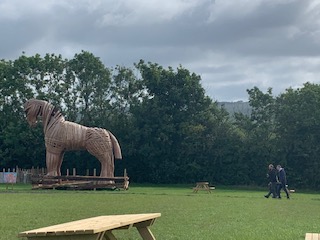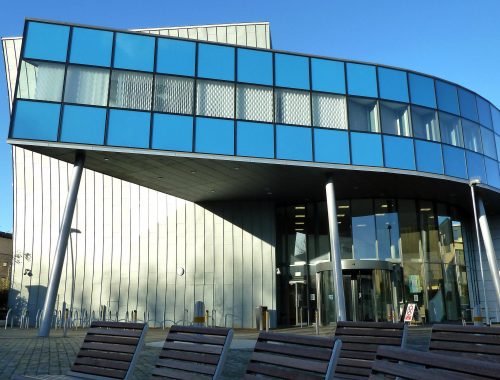Second Guessing Myself: Is Drama Really the Career for Me?
Since I was young, I haven’t really fitted the educational ‘norm’. I’ve always been a square peg in a round hole. In school I came alive in the drama classroom. I had fun, I made friends, I could be who I wanted to be and I could write my own script. I learned about the theatre and became inspired to work in a capacity that would allow me to create theatre for children. I learned about the field of drama, and what it might be able to offer me. This isn’t to say that since then people haven’t been trying to put me off working in the children’s theatre industry, but that doesn’t mean I’ve ever listened; however now I’m second guessing myself.
The Motive:
This blog post intends to dissect and reflect upon my first experiences with the Replay Theatre Company on a show called Curtains. In this blog I intend to use the Gibbs Reflective Cycle, first coined by Graham Gibbs.(Gibbs 1988). On the practice of critical personal reflection, Gibbs states ‘It is not sufficient simply to have an experience in order to learn. Without reflecting upon this experience it may quickly be forgotten or its learning potential lost.’ (ibid, 14) The below image highlights Gibbs’ methodology.
Figure 1.1 (Hamilton 2017)

The Means:
My first placement week on Curtains was my first experience with a theatre company. The show location was the Stendhal Festival, located on a farm on the outskirts of Limavady; and whilst initially the thought of working at a festival seemed attractive, the reality of the work quickly became apparent. The outdoor show was subject to the elements (no one expected our makeshift gazebos to last throughout the night), the ladders we brought sank in the mud to the point where their height became insignificant, the dance floor was often slippery because of the rain, and it posed significant risk to the actors were anyone to trip (scan the QR for a better image of the impact of weather on our shows.). However, the audience were oblivious to any backstage anxiety; children laughed heartily, parents revelled in the hour of peace to nurse their hangovers from the rave the night before, and the technical issues faced during the show were close to non-existent.

About theatre for children, Dragan Klaic suggests that:
One could argue that the quality of theatre for children and youth is an indicator of the maturity and sophistication of a theatre culture in any given country, its sense of vision and responsibility, its deliberate investment in the future theatre audience.(Klaic 2012).
Klaic also notes the marginalisation of theatre for children. If our performance of theatre for children establishes the responsibility of the theatre for young people in the future, the community nature of it generates a positive outlook, but the lack of a theatre venue also suggests a lack of funds. Personally, I find that the allocation of funding for the arts in Northern Ireland is minimal, and thereafter funding for children’s theatre is further reduced. The financial deficit in Northern Ireland arts suggests that to work in children’s theatre can and will be difficult. In the same way then, I had to question whether a future in children’s theatre remained a viable option.
The Opportunity:
Undeniably, whilst I enjoyed the feeling of accomplishment at the end of the day, I also felt physically over-worked. The stage manager and the technical stage manager required lots of help for menial tasks, and often even they struggled to communicate what specifically they wanted from me. I either felt very busy, or like a spare part, and no one uses a spare part all the time, they often only fulfil their purpose in the most stressful of times. I felt like the company I was working with didn’t plan any work that I could fulfil when I was with them. I think that when I look at the bigger picture, every intern struggles. The lowest paid person in the room is often the one working the hardest to take their next step up. I have a friend who is currently in an internship at a construction company in Northern Ireland, and our stories are eerily similar. The problem I feel with the drama industry is that money rules; many actors live on the breadline and rely on Benefits such as Universal Credits just to get by. In any eventuality, whether my experience had been good or not, I would still have had to confront this reality. On the subject of internships, Terrence Dove suggests that ‘Be sure to take time during the experience to carefully reflect if what you are doing is your dream.’(Dove 2017). Here lies the most important question. Would I be able to stay in this industry? Could I overcome the dissatisfaction and inter-relational issues that come with working alongside diverse personalities enough to go into a performing career?
The Verdict:
The difficulty with reflective practice is that an experience can be one-dimensional. This perspective is limited to my prior knowledge, and my first experience of children’s theatre. I think that the lack of access for young people to theatre companies at a high school level also makes it difficult for young people to fully understand the drama industry before making important career choices. Many (non-theatre) jobs have permanent contracts, fixed hours, and a competitive pension scheme. The drama industry is positively and diversely different. Often the reason that people join the theatre industry is because they believe it will be a lucrative endeavour. However, what makes people stay in the theatre industry is their enjoyment of it.

The Moral of the Story:
I, like many others before me, find myself at an impasse. I think that if I had personally undertaken better screening of my options for my work experience, and made clear my desire to creatively, rather than technically explore the industry, my experience may have been a less negative one. However, my experience has also taught me that the reason that we work in the drama industry is because we enjoy it. Many people start off creative work as a hobby, and it becomes their passion. I think that the most challenging aspect of this experience is that I have realised there is a separation between my heart and my head. My head knows that this is a career with great risk, both mentally and financially, but my heart tells me that drama fulfils me, in a way that a desk job never could. Ultimately, I believe this experience gives me a unique perspective of the drama industry, which will have a significant impact upon my own decision making, thus proving the purpose of the placement itself, and the weighting of reflectively considering my experience.




Figure 1.4, 1.5, 1.6 & 1.7
Terrence Dove, 2017. ‘Internships: 7 Things You Need to Know `’, Hispanic Engineer and Information Technology 32: 3.
Graham Gibbs, 1988. Learning by Doing (Further Education Unit London).
Emma Hamilton, 2017. ‘Reflective Learning’, Accessed 16/11/2021. file:///C:/Users/User/Documents/Work%20Placement%20Module%20Documents/download.htm.
Dragan Klaic, 2012. Resetting the Stage (Intellect Bristol).
You May Also Like

First Day Fears
24 November 2021
Roles Reversed
26 November 2021
